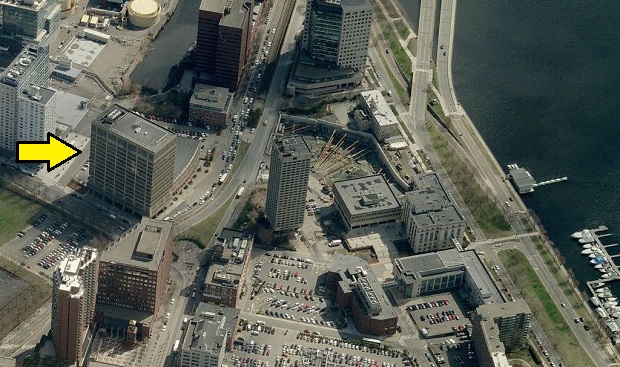
Located at the MIT-owned One Broadway Street building in Kendall Square, Cambridge Innovation Center (CIC) houses more than 175 companies in over 100,000 square feet of office space and prices everything per person, so smaller companies can add more space as they grow. There are no long-term leases, either–it’s all month to month.
I had a chance to take a tour with Cambridge Innovation Center CEO Tim Rowe. The CIC website says that pricing varies and “a good rule of thumb is that the price range is between $790 and $1000 per month per person.” I soon found out that there are more affordable options available, and that there are plenty of nice extras included in the price.
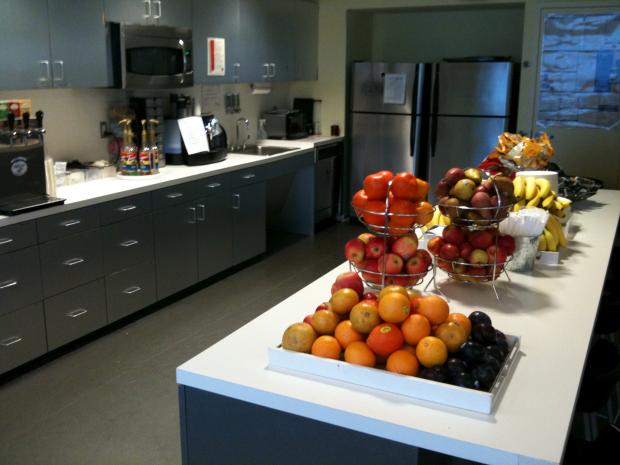
There’s a Google-like abundance of free food, coffee, and tea, and CIC even retains one of Google’s massage therapists (massages aren’t free, but CIC doesn’t mark up the prices). Internet access is also free, backed by an “enterprise-class Wi-Fi solution” (dual-band, 802.11n) from Ruckus Wireless.
“The kitchens are for everybody,” said Rowe. “Everything’s included, it’s free. There’s Dove bars in the freezer, the produce is all organic, there’s sparkling water, espresso, whatever. You’re gonna work, you should be comfortable, you should be happy. You should just chill and enjoy yourself. The hope is that if you’re enjoying yourself you’ll be more productive.”
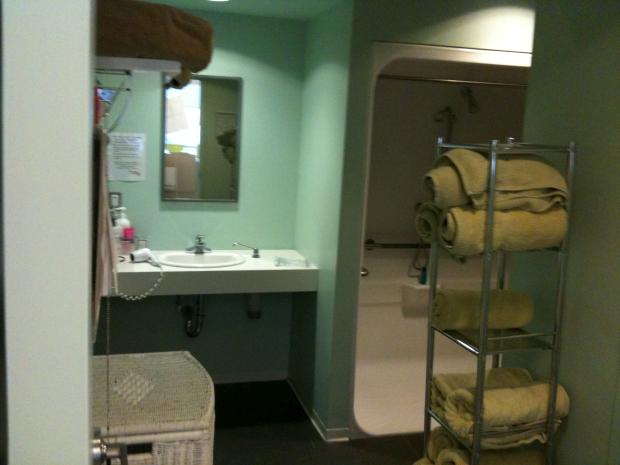
True to the startup spirit, there are showering rooms. So bike to work, shower, pull an all-nighter, shower, and repeat. There’s also a nursing room for mothers with newborns.
“We have people on eight floors and we just had a groundbreaking the other day with the governor and the president of MIT for another 57,000 square feet of space, so there’s going to be a lot more startups here,” said Rowe.
“We’ve got shower rooms, a massage therapy room, we’re putting in a ping pong room in the new space. Basically just like you would have in your own office, except you don’t actually need the ping pong room all the time if you’re one startup and you don’t really want to pay for that space, so if you could share that cost with a lot of other people that’s better. That’s the model here.”
“We have spaces for little companies. These are basically one-person companies,” said Rowe, motioning to a bank of smaller offices. “So you get one desk, locked file cabinet, and a phone. This is a lot cheaper, like $500 a month, and when you get bigger you might move into a bigger office at around $750 per desk per month.”
I asked Rowe if they take anyone or if there’s some sort of vetting process. He replied, “We take essentially anyone. If there was an integrity issue or something like that, then that would be a problem but we don’t have a ‘we have to like your startup’ kind of thing.”
“We also have this little section called Flex Space,” Rowe continued, “It’s $375 a month and you have a phone here and a mailing address here, but you can only work here one day a week. So it’s for someone who might be in a lab at MIT and they’re starting a business while they’re at the university. You can’t legally have your company in a lab at MIT. It has to have its own outside address, and if you’re not careful with that then MIT can assert that it owns everything that your company has. You definitely want to have someplace where you can say, ‘Oh, I actually have an office here. That’s where I made that.” So that’s what the Flex Space is for.”
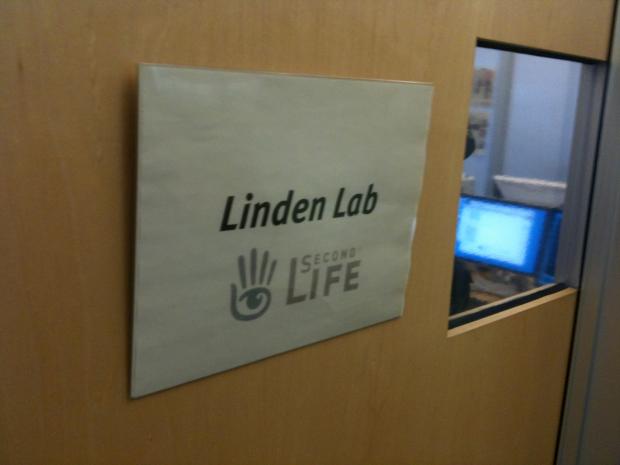
Some tiny company called Linden Lab has a huge office here. They’re working on something called Second Life. I don’t think it’ll take off, but that’s just me. Ha!
Rowe explained, “One of the things they do in this office is, literally, the weather—the rippling of the waves, the clouds in the sky, stuff like that. It’s very high tech. And they’re usually having a ball in there.”
Other current and former companies include Ambient Devices, Draper Fisher Jurvetson, New Atlantic Ventures, Carbonite, Conduit Labs, Hubspot, GreatPoint Energy, and plenty more. CIC-affiliated companies have raised over a billion dollars in the past ten years.
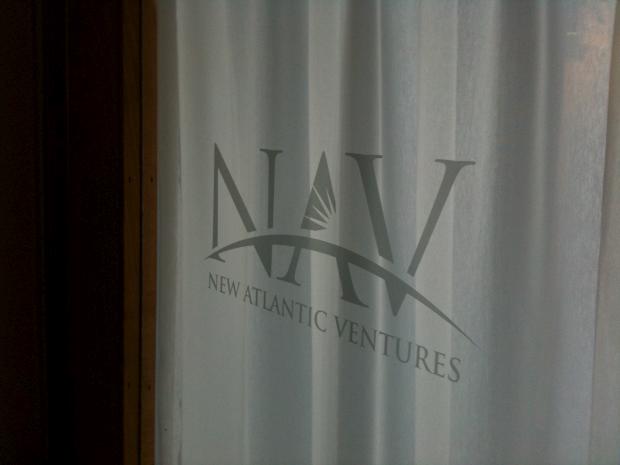
Plenty of venture capital companies rent office space in the CIC, so startups are always in pretty close proximity to the types of people they’re trying to woo.
“We have venture funds here,” said Rowe. “This is the conference room for New Atlantic Ventures—full disclosure, I have a part time venture partner with this fund. You can check them out on The Funded, it’s the number one ranked venture fund in the country.”
“How much funding has gone into the companies here?” I asked.
“We’ve tracked about $1.1 billion worth of venture funds going into the companies here so far,” replied Rowe.
“And how much of that funding comes from venture funds working in this building?” I asked.
“It���s surprisingly small,” answered Rowe. “I would say, like, five percent of that. The venture funds that are based here invest everywhere, not just here. And lots of venture funds elsewhere invest here. That’s the way we like it. If you’re a startup, you want to go to anybody for funding. And if you’re a VC, you’re going to invest in whatever the things are that you particularly like, not just things that happen to be down the hall.”
“There are multiple competing VCs here. In fact, we have office hours here for various VC funds. Over the next 12 weeks we’re going to have 12 different funds—one each week—doing their office hours here. So it’s what you’d expect. It’s a very open platform. Anybody can talk to anybody. We’re opening the office hours to the public during the window of time when those are happening, which is Thursdays 2PM to 5PM. We’re not making it really public, we’re not advertising it or anything, but we’re tweeting it so people who are in the venture community and want to run into other entrepreneurs know that this is where it’s happening.”
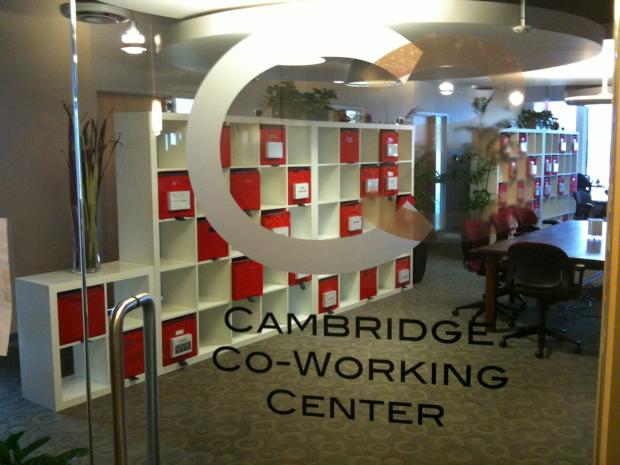
For those who aren’t quite to the we-need-an-office stage yet but are tired of working from home and coffee shops, CIC just opened the Cambridge Coworking Center. For $250 per month, you have access to just about everything the CIC has to offer except a private desk, landline, and physical mailbox.
Said Rowe, “This is C3, the Cambridge Coworking Center. It’s part of us. It’s a different model. As you can see here, you have your little cubby. It’s $250 a month, so it’s half the price of what you saw upstairs. It’s kind of like a library/reading room feel. There’s no phone on the desks, so you’re going to use your cell phone which most of us do anyway. There’s no mailing address. It’s not about pretending to be here when you’re not, this is actually ‘I want to go somewhere to work,’ and by stripping some of those pieces out it makes it cheaper for us, and we’re able to offer it for a price that’s unbelievably low compared to what people would normally expect.”
“I would say that the reason people come here is mostly for community,” continued Rowe. “If you’re working out of your house, it’s an isolating experience. Starbucks is an interesting alternative, but it’s a different group of people every time—what they call a third place. It’s not home, it’s not work, it’s a place which is intentionally to be around random people. But the second place—the work place—what it’s distinguished by is a consistent group of other people. So you get there in the morning you’re like, ‘Hey, how are you doing? How are the kids? I heard you went skiing last weekend,’ that kind of stuff. You don’t get that at Starbucks because it’s not a consistent group of people.
“And it’s very loud,” I said.
“It’s loud and you feel like you’re taking up a table and you’re not really supposed to be working there all the time. You’re supposed to be working here and it comes with the free coffee. If you do the math on what it costs you to work consistently out of cafes over the course of a month, it’s probably about the same cost as it is here.”
Cambridge Innovation Center [cictr.com]